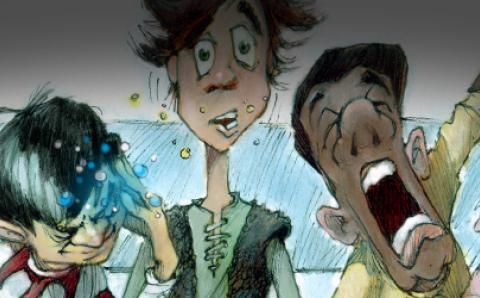Solomon Northup (Chiwetel Ejiofor), a free African American in 19th-century upstate New York, just wants to work hard, enjoy his wife and three children, and live in freedom. When two white kidnappers pose as recruiters to secure his fiddle playing for the circus, his life instantly changes. He is taken into slavery and thrown into a culture alien to him. This harrowing journey, captured in his 1853 autobiography, pulls us into the harsh life of slavery in Louisiana. Screenwriter John Ridley and director Steve McQueen have brought his story to life in one of the most gripping and realistic depictions of slavery shown in American cinema.
In Northup’s quest to return to the fresh air of freedom and family, he endures numerous overseers who beat him to accept his slave status. But he refuses to submit. As he is transported to another plantation on a boat, he fights the two prevailing options of staying alive as a slave: survival or rebellion. He chooses to live instead of merely to survive or to rebel.
Northup’s story provides one of the few firsthand accounts of slavery from a free black man’s point of view. Through McQueen’s lens, we see how Northup labors through 12 years of hot, backbreaking work cutting sugar cane, picking cotton, and running errands for his hard-drinking, womanizing master, Edwin Epps (Michael Fassbender). Memories of freedom and family keep him alive.
Two portions of the movie get to the heart of Northup’s story. First, field hand Patsey (Lupita Nyong’o) is central in showing the brutality slaves experienced at the hands of their masters. She is hated by the wife (Sarah Paulson) of her master, Epps, because she is his kept woman. Epps takes advantage of her, and as his property she has no choice. She endures one of the worst whippings I have ever seen in a movie. To Patsey, death is more benevolent and merciful than the constant rape.
Second, the use of the whip throughout the movie is an image of degradation and forced submission that is hard to shake. The whip is the weapon of choice by masters and overseers, and it is used often. I felt every lash as it stripped backs and peeled off flesh as cries of pain echoed from the slaves. Tears fell down my face as I watched.
A major theme in the movie is the use and misuse of religion. Northup learns the value of slave religion as he buries a fellow slave and is moved to sing “Roll, Jordan Roll.” At the other end, we see the slave master’s misreading of Scripture to maintain divine approval for slavery. The two views are strikingly dissimilar, as both slaves and slave masters believed the same book of God.
This is a movie people need to view, discuss, and reflect upon as Christians. The acting is superb. The story is difficult yet redemptive. Northup’s story is history we need to know.
[Note: This movie is rated R; expect some nudity and violence.]
About the Author
Reginald Smith is the Director of Diversity for the Christian Reformed Church. He attends Madison Square Church in Grand Rapids, Mich.









